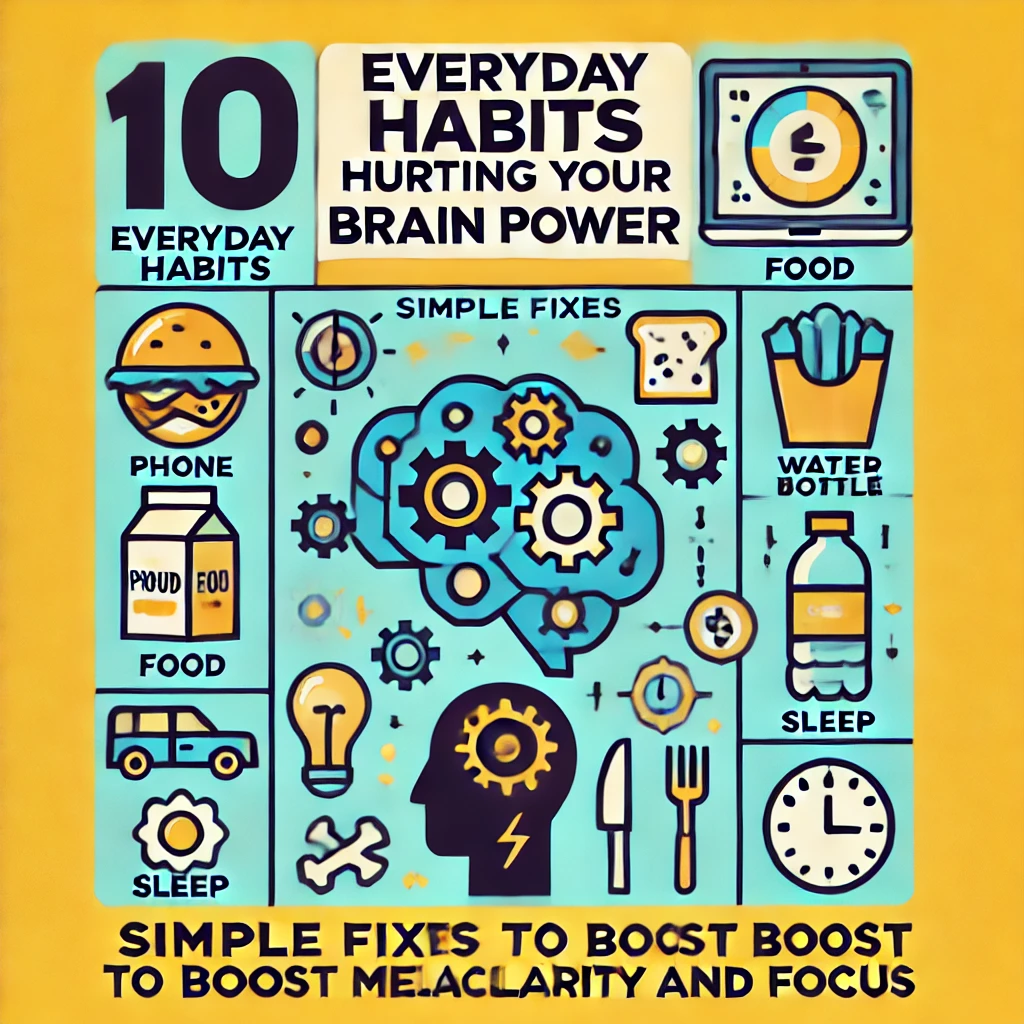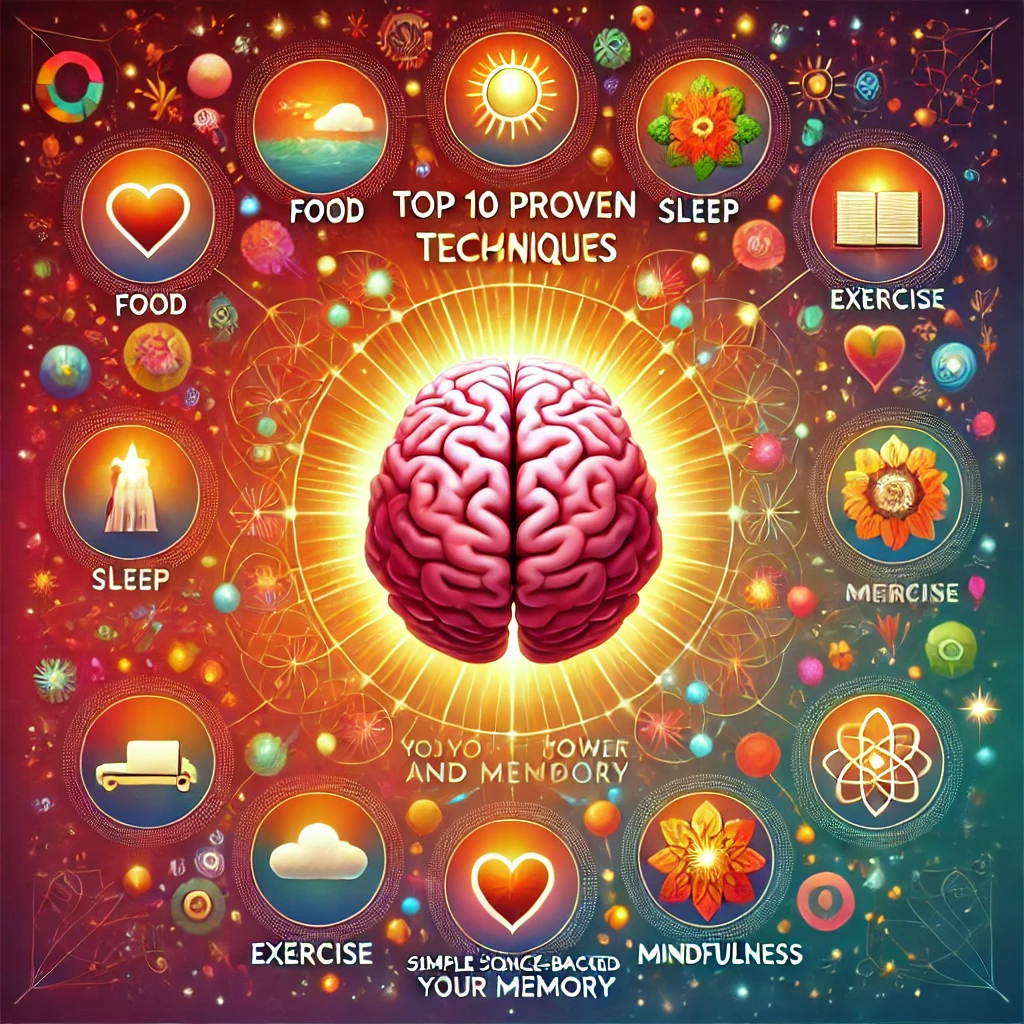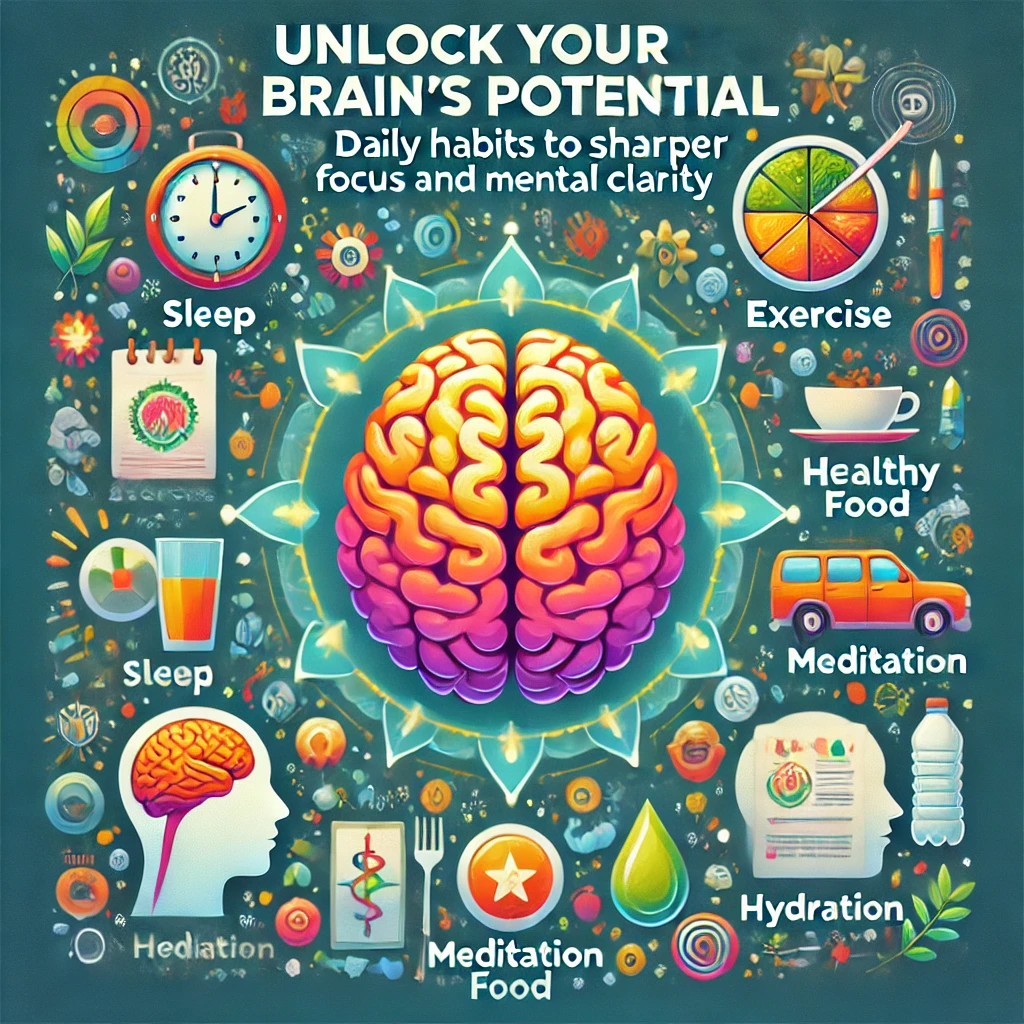Introduction
We often think of brain health as something that needs special care, like puzzles, reading, or mental exercises. But what if some of our everyday habits were actually harming our brain power? Small, seemingly harmless habits can sneakily impact our cognitive function, mental clarity, and overall brain performance without us realizing it. The good news? Recognizing and fixing these habits can help improve brain health naturally and boost our mental agility.
In this guide, we’ll explore ten common habits that might be hurting your brain power and provide simple, effective solutions to fix them. Let’s take a closer look at what might be holding your brain back and how to start making positive changes today.
1. Skipping Breakfast
Breakfast is often called the “most important meal of the day” for a reason. Skipping it might save you time in the morning, but it could be one of the everyday habits harming brain power. A lack of proper nutrients can reduce glucose levels, leaving you sluggish and unfocused.
Why it matters:
Your brain needs energy to function well, especially after a night of fasting. Skipping breakfast reduces glucose supply, making it harder to concentrate and think clearly.
Relatable anecdote:
When I used to rush out the door without breakfast, I noticed I’d feel tired by mid-morning, struggling to focus. But after making time for a quick breakfast, like a smoothie or yogurt, I felt sharper and more energized throughout the day.
How to fix it:
Even a small breakfast can make a difference. Try options like whole-grain toast, eggs, or a smoothie with protein and fiber to jumpstart your day and provide lasting energy for your brain.
2. Not Getting Enough Sleep
It’s no secret that sleep is essential, but many of us still don’t get enough. Lack of sleep is one of the primary habits that reduce brain function. When we’re sleep-deprived, our cognitive function, memory, and reaction times suffer, and chronic sleep loss can lead to more serious issues over time.
Why it matters:
During sleep, our brains clear out toxins, process memories, and repair cells. Without adequate rest, it’s harder to focus, learn, and retain information.
Example:
I once pulled an all-nighter to meet a deadline, thinking I’d just “power through.” But the next day, I was so mentally foggy that I could barely get anything done. It taught me that sacrificing sleep for productivity is a short-term solution with long-term downsides.
How to fix it:
Aim for 7-9 hours of quality sleep each night. Establish a calming bedtime routine, avoid screens before bed, and try to keep a consistent sleep schedule, even on weekends.
3. Relying Too Much on Processed Foods
Processed foods, often high in sugars, unhealthy fats, and preservatives, can be bad habits affecting brain performance. Regularly consuming processed foods increases inflammation in the brain, which can interfere with memory and learning.
Why it matters:
Your brain relies on a steady supply of nutrients. Processed foods can lead to inflammation and energy crashes, impacting cognitive performance and mental clarity.
Relatable anecdote:
I noticed that on days I grabbed fast food for lunch, I’d feel sluggish and have trouble focusing afterward. When I switched to healthier options, like salads and whole grains, I found I could concentrate better and stay alert.
How to fix it:
Opt for whole foods whenever possible. Incorporate more fruits, vegetables, lean proteins, and healthy fats (like those from nuts or avocados) into your diet to give your brain the nutrients it needs.
4. Too Much Screen Time
In today’s digital world, screen time is inevitable, but too much of it can be one of the lifestyle habits impacting mental clarity. Excessive screen time strains the eyes, impacts sleep quality, and can reduce the brain’s ability to focus on non-digital tasks.
Why it matters:
Spending long hours on screens, especially without breaks, can lead to digital eye strain and reduce attention span, affecting productivity and brain function.
Example:
I used to scroll through my phone before bed, but I often had trouble falling asleep afterward. When I decided to cut down on evening screen time, my sleep improved, and I felt more focused the next day.
How to fix it:
Set boundaries around screen time. Try the 20-20-20 rule: every 20 minutes, look at something 20 feet away for at least 20 seconds. Additionally, limit screen exposure at least an hour before bed to improve sleep quality.
5. Living a Sedentary Lifestyle
Lack of physical activity is another common habit that can harm brain power. Regular exercise boosts blood flow to the brain, supporting cognitive function and helping to clear out toxins.
Why it matters:
Exercise promotes the release of chemicals that support brain health, like endorphins and brain-derived neurotrophic factor (BDNF), which support memory and mood.
Relatable anecdote:
I found that on days I took a short walk, even just 10-15 minutes, I’d return to my work with fresh ideas and more focus. It’s amazing how a small movement break can recharge your brain.
How to fix it:
Incorporate movement into your day, even if it’s small bursts of activity. Aim for at least 150 minutes of moderate exercise each week, like walking, cycling, or even dancing.
6. Neglecting Mental Stimulation
Your brain needs regular stimulation to stay sharp, just like your body needs exercise. Not challenging your brain with new activities can lead to mental stagnation and reduce cognitive function over time.
Why it matters:
Mental stimulation strengthens neural connections, helping to improve memory, problem-solving skills, and mental agility.
Example:
I started doing a daily crossword puzzle and was surprised at how much it helped me think creatively. It became a fun way to stimulate my brain and break out of my routine.
How to fix it:
Incorporate brain-boosting activities into your routine, like puzzles, reading, or learning a new skill. These activities challenge your brain and promote mental flexibility.
7. Multitasking Too Often
Multitasking may seem like a productivity hack, but it’s actually one of the common habits that hurt cognitive function. Constantly switching between tasks divides your focus and makes it harder for your brain to retain information.
Why it matters:
The brain performs best when it focuses on one task at a time. Multitasking can lead to mental fatigue, reduce efficiency, and negatively impact memory.
Relatable anecdote:
I used to juggle emails, phone calls, and projects all at once, thinking I was getting more done. But in reality, I made more mistakes and had to redo tasks. When I started focusing on one task at a time, my productivity and accuracy improved.
How to fix it:
Focus on one task at a time, completing it before moving on to the next. Use techniques like time blocking to give each task your full attention, reducing cognitive overload.
8. Not Drinking Enough Water
Dehydration might seem harmless, but it can be one of the everyday habits harming brain power. Water is essential for brain function, and even mild dehydration can affect focus, memory, and mood.
Why it matters:
The brain is about 75% water, so staying hydrated helps maintain cognitive function, supports concentration, and reduces brain fog.
Example:
I used to forget to drink water during the day, and by the afternoon, I’d feel mentally drained. Once I made hydration a priority, I noticed I had more energy and could think more clearly.
How to fix it:
Keep a water bottle with you and aim to drink regularly throughout the day. Hydration needs vary, but a good starting point is around eight 8-ounce glasses of water per day.
9. Constantly Stressing Out
Chronic stress is one of the worst habits affecting brain performance. When we’re constantly stressed, our bodies produce excess cortisol, which can impair cognitive function, memory, and mood over time.
Why it matters:
Stress activates the “fight or flight” response, which diverts resources away from the brain, leaving you feeling mentally drained and less able to focus.
Relatable anecdote:
When I used to stress over minor things, it often left me feeling mentally exhausted and unproductive. But after I started practicing stress-management techniques, I felt more focused and calm, allowing me to think more clearly.
How to fix it:
Practice stress management techniques like mindfulness, deep breathing, or exercise to reduce stress. Even taking short breaks throughout the day can help alleviate stress and refresh your mind.
10. Ignoring Social Connections
Social connections aren’t just good for your heart—they’re also crucial for brain health. Isolation or neglecting relationships can be one of the lifestyle habits impacting mental clarity, as social interactions stimulate cognitive functions like memory, communication, and emotional regulation.
Why it matters:
Engaging in meaningful conversations and relationships stimulates the brain, helping to maintain cognitive function and improve mood.
Example:
During a busy work period, I found myself isolating and working non-stop. When I finally took time to catch up with friends, I felt re-energized and more focused. The social connection was exactly what my brain needed to recharge.
How to fix it:
Make time for friends and family, even if it’s just a phone call or a quick coffee. Engaging in social activities boosts brain performance and keeps your mind sharp.
Conclusion
Many of us unknowingly engage in everyday habits that reduce brain function, from skipping breakfast to stressing too much. But by recognizing and adjusting these habits, we can improve brain health, enhance mental clarity, and protect cognitive function in the long term.
Try incorporating one or two of these fixes into your routine, and you’ll likely notice a difference in your focus, memory, and overall brain performance. Remember, small changes can make a big impact on your brain health, so start with what feels achievable and build from there.
FAQ Section
1. Can skipping breakfast really harm brain power?
Yes, skipping breakfast can lower glucose levels, making it harder to focus and think clearly. Starting the day with a healthy breakfast can support cognitive function.
2. How does lack of sleep affect brain performance?
Poor sleep impairs memory, focus, and mood, reducing overall brain performance. Aim for 7-9 hours of quality sleep each night to keep your mind sharp.
3. Are processed foods bad for brain health?
Yes, processed foods can increase inflammation, which can impair memory and cognitive function. Whole foods are a better choice for brain health.
4. How can I limit screen time effectively?
Try the 20-20-20 rule: every 20 minutes, look at something 20 feet away for 20 seconds to reduce eye strain and improve focus.
5. What are some easy ways to add physical activity to my day?
Take short walks, use the stairs, or incorporate stretching into your day. Even small amounts of movement can benefit brain function.
6. Can dehydration really impact cognitive performance?
Yes, even mild dehydration can affect focus, memory, and mood. Keep a water bottle handy to stay hydrated throughout the day.
7. Does multitasking harm brain power?
Yes, multitasking divides attention and can lead to mental fatigue, reducing cognitive performance. Focusing on one task at a time improves productivity and clarity.
8. How does stress affect the brain?
Chronic stress increases cortisol, which can impair memory and cognitive function. Managing stress is essential for brain health.
9. How important are social connections for brain health?
Social interactions stimulate the brain and support cognitive function. Maintaining relationships can boost mental clarity and improve mood.



